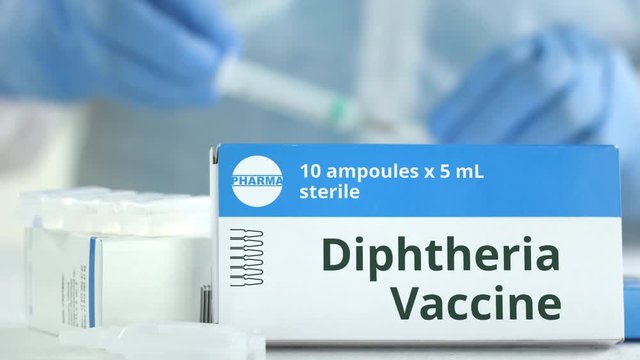By Iyemah David
The Federal Ministry of Health and Social Welfare said it is aware of the mounting concern regarding the recent Diphtheria outbreak across several states with over 11,000 suspected case.
The ministry gave the assurance that urgent vaccination efforts were underway.
The Executive Director of National Primary Health Care Development Agency (NPHCDA), Dr Faisal Shuaib, gave the assurance in an interview with the News Agency of Nigeria (NAN) on Monday in Abuja.
He said that since the confirmation of the re-emergence of diphtheria, the Federal Government had continued to respond to the outbreaks across different states.
According to him, as at September 24, there were 11,587 reported suspected cases, of which 7,202 were confirmed from 105 Local Government Areas (LGAs) in 19 states and the Federal Capital Territory.
“Most of the cases (6,185) were recorded in Kano. Other states with cases are Yobe (640), Katsina (213), Borno (95), Kaduna (16), Jigawa (14), Bauchi (8), Lagos (8), FCT (5), Gombe (5), Osun (3), Sokoto (3), Niger (2), Cross River (1), Enugu (1), Imo (1), Nasarawa (1) and Zamfara (1).
“The majority (5,299 (73.6%) of the confirmed cases occurred among children aged one year to 14 years with those aged five -14 bearing most of the brunt of the disease.
“So far, a total of 453 deaths have occurred in confirmed cases, giving a case fatality rate (CFR) of 6.3 per cent,” Shuaib explained.
He said that given the escalation of the outbreak and findings that 80 per cent of confirmed cases were unvaccinated, the Coordinating Minister of the FMOH&SW, Prof. Muhammad Ali Pate, set up a national emergency task team co-chaired by himself.
“I am chairing the task force alongside the Director-General of the Nigeria Centre for Disease Control (NCDC) for higher level coordination of outbreak response efforts.
“This includes ensuring optimal collaboration of all relevant health stakeholders in this fight.
“Other prominent members of the task force include the director of public health in FMOH, representatives of the Federal Ministry of Information, World Health Organisation (WHO), UNICEF, USCDC, USAID, GAVI, other non-governmental organisations and development partners,” Shuaib quoted the minister as saying.
He said that Diphtheria was caused by a toxin produced by bacteria, Corynebacterium diphtheriae, and it was a vaccine-preventable disease covered by one of the vaccines provided routinely through the country’s childhood immunisation schedule.
“A historical gap in vaccination coverage is a driver of the outbreak given the most affected age group (five –14) and results of the nationwide diphtheria immunity survey that shows only 42 per cent of children under 15 years old are fully protected from diphtheria” he said.
Dr Shuaib added that since the confirmation of the outbreak, the FMOH&SW through its agencies had been coordinating surveillance and response activities across the country.
“These include response coordination, surveillance, laboratory investigation, vaccination, case management and risk communication activities,” he said.
Shuaib said that the activities included establishment of Diphtheria Emergency Task Team responsible for the overall coordination of all activities encompassing government and development partners’ response activities at national and sub-national levels.
He added that the activities included implementation of an Incident Management System (IMS) through the activation of a National Diphtheria Emergency Operations Centre (EOC) at NCDC, tasked with orchestrating the coordinated efforts of multiple response pillars during the outbreak, as well as deployment of national rapid response teams to affected states.
“Development of draft National Diphtheria Surveillance and Response guidelines.
Sensitisation/training of clinical and surveillance officers on the presentation, prevention, and surveillance of diphtheria. Harmonisation of surveillance and laboratory data from across states and labs,” he said.
He said that establishment and expansion of Diphtheria Laboratory Network to strengthen laboratory confirmation of diphtheria at national and sub-national levels, was part of the activities as well as building capacity of state-owned public health laboratories for diphtheria diagnosis.
The executive director said that intensification of routine diphtheria immunisation and reactive vaccination campaigns in 33 local government areas across five states – Bauchi, Katsina, Yobe, Kano and Kaduna – by the NPHCDA, was also part of the response activities.
He advised that parents should ensure full vaccination that their children were fully vaccinated against diphtheria with the three doses of diphtheria antitoxin-containing pentavalent vaccine given as part of Nigeria’s childhood immunisation schedule.
Shuaib also advised Nigerians to avoid rumour mongering and share only verified information.


